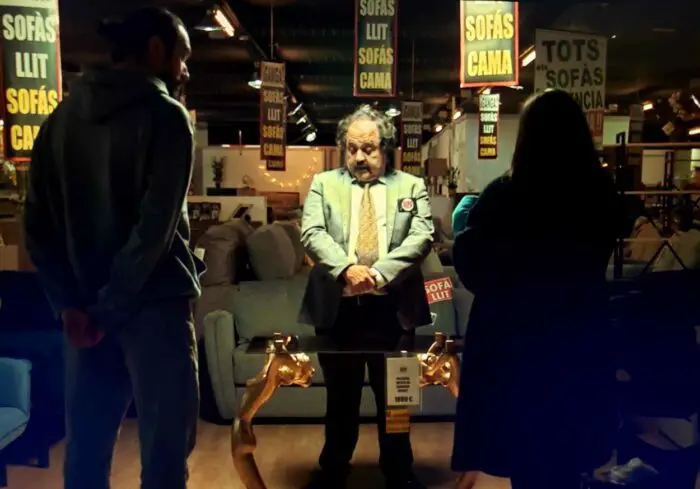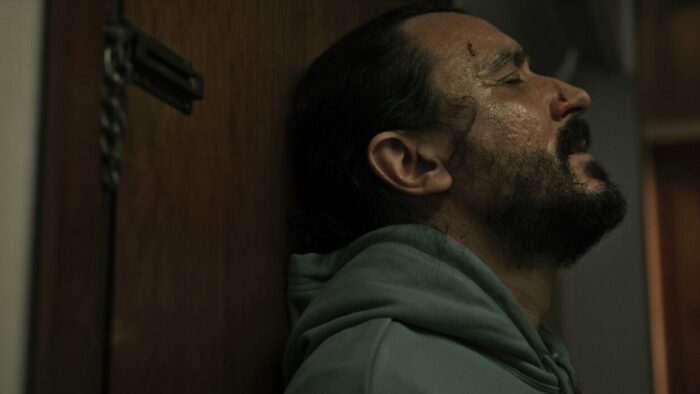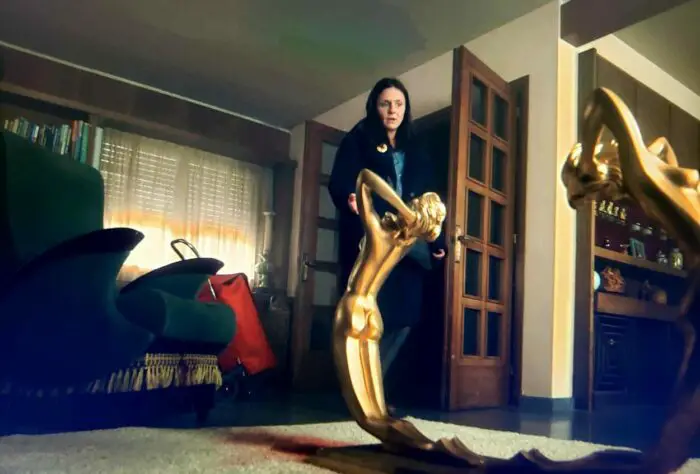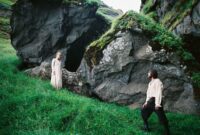The Coffee Table shows how horrible furniture can be. Décor as destroyer is an intriguing way of pointing out certain things are so petty it isn’t worth ruining a life or a marriage fighting over. As such, this Spanish-language movie explores tragedy with a borderline black humor that is as gruesome as any on-screen evisceration. The slow burning and creeping pace towards its grim conclusion doesn’t always benefit the film, but it does give time for some solid acting to build up brilliant tension.
The movie opens with Jesús and María buying the titular table. Played by David Pareja and Estefanía de los Santos, the married couple has a newborn in tow, while a sleazy salesman tries to push an arguably unappealing coffee table on them. It’s clear their marriage is currently strained. However, Jesús insists, in spite of María’s objections, on purchasing this particular piece of furniture. She relents, and they take it home. What follows is a grim, almost absurd accident involving the coffee table, that destroys their lives.

The main horror in this psychological drama is a wonderful combination of elements, specifically the juxtaposition of dialogue in relation to events. Jesús alone is aware of the tragedy, and characters sometimes attempt playful exchanges with him. Conversations that might be lighthearted chiding mutate due to a hideous subtext since people don’t realize they’re twisting the knife, so to speak. Imagine complaining about petty problems to someone who just experienced the peak of tragedy, and you start to understand the maliciously delicious dark humor blended with savory horror in The Coffee Table.
All the while, the audience gets to witness Jesús unraveling. David Pareja does an excellent job of shifting his performance one tick at a time as the character spirals. His slow-motion breakdown allows for endearing soft moments and vicious snaps. The psychological torment he endures isn’t one furious instant, but a torturous slog towards the nightmare’s end. Yet, it’s the effort to spare others the horrible truth of events that makes The Coffee Table as much tragedy as it is horror.
Estefanía de los Santos does a marvelous job of sharing this grim walk through hell. Unfortunately, her character María is blissfully unaware of the black hole her family orbits. It makes for some scenes where audiences can’t help but wince, particularly when she and Jesús start repairing their marriage. It becomes clear, though strained, their relationship just needed a little love to heal. However, that was before the coffee table. And Estefanía de los Santos does an amazing job of portraying the vast array of emotions someone in her position would have. From disapproving wife to devoted mother and tender lover, she gives María a depth that makes a viewer unsettled knowing there is no joy in her future.
That’s the real horror of The Coffee Table. Director Caye Casas along with writer Cristina Borobia have composed a terrible event but wisely chosen to refrain from bloody shocks. Make no mistake, there’s an emotional gore present in almost every scene, and a few implicative frames that give enough for the imagination to paint something hideous. But here, the shocks and apprehension are without much blood. Not unlike the tension in a slasher film, knowing the killer is lurking, waiting for some hapless individual to enter a room, The Coffee Table excels at the squirm inducing strain of watching people inevitably move towards disaster.

The only downside may be that this one note gets played a tad too often. The Coffee Table leans so heavily on what it does well the movie never risks a change in gears. It’s always the same scenario with minor variations. The consequence is that the horror loses a bit of its punch, while that slow burn begins to fizzle a tad. When the film does shift, the conclusion results in a rushed ending.
Still, the movie can be applauded for not veering into bloody bids for attention. The Coffee Table is a psychological drama that occasionally induces dark comedy chuckles. Its cast does a wonderful job of conveying the moods which make this movie as much horror as humor. The latter stemming from the absurd nature of certain exchanges after the tragic incident.

There’s also some lovely subtle cinema at work. Though most of the movie takes place in one apartment, lighting choices have a profound effect. One room where characters gather to talk about happy topics is well-lit and full of bright pastel colors. However, Jesús lingers in the dark hallway, hesitant to enter the light. Furthermore, director Caye Casas does an interesting job of keeping the coffee table in view during certain scenes. It becomes a mute undermining presence while characters carry on merrily oblivious. Consider how a character named Cristina, played admirably by Claudia Riera, stands over a bloodstain beside the coffee table, chatting rosily while wearing a t-shirt that reads “No Bad Days”.
Otherwise known as La mesita del comedor, The Coffee Table is a unique horror film. It eschews bloody shock for emotional gore. Solid subtle performances by its leads, Estefanía de los Santos and David Pareja, help make this dark comedy truly tragic. Though the film slows a touch then rushes the end, The Coffee Table is a special kind of psychological nightmare. More tragic than terrifying, this humanist horror story wonderfully reminds how fright flicks exist on a spectrum. One with potential not fully explored.
The Coffee Table hits a run of American festivals this September with additional screenings throughout Fall before arriving on VOD and DVD this January.



